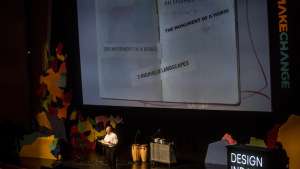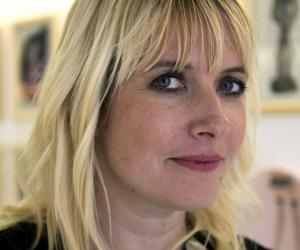South Africa's favourite science fiction author Lauren Beukes brings an element of theatre and drama to the stage with an unusual presentation at Design Indaba Conference 2014.
The writer – winner of the UK's highest award for science fiction, the Arthur C. Clarke Award, in 2011 – uses what she know best, the art of storytelling, to weave a compelling journey for the audience. In so doing, she reveals her creative process, which draws on her personal and collective history and experience to tackle some of the tough issues our society faces, such as the abuse of power, xenophobia, crime and guilt.
Beukes uses the device of a box containing a mystery object as a prompt to explore not only the power of storytelling to shape our understanding of the world but also to challenge this status quo and ultimately to build empathy.
Stories make sense
She goes back in time to show the ancient roots of storytelling as a way to make sense of the world.
“Our ancestors used to hide out in caves and tell stories around the fire partly to defend themselves against the very scary things that lived outside the cave but also to control the world outside,” she says.
People constructed myths to explain natural phenomena, for example the goddess of night, who would sweep her cloak of stars across the sky and then be chased away by the Sun god on his fiery chariot.
Stories are power
Because stories have this power, they imbue the storyteller with a certain power – “to control the world through stories”.
“In this country for a very long time we didn't know our story,” says Beukes, referring to the Apartheid government’s censorship measures that ultimately controlled the grand narrative of the country.
Post-apartheid, the Truth and Reconciliation Commission (TRC) started to uncover a fuller story told by both perpetrators and victims.
Beukes says that one of the most remarkable things about the TRC was that the translators who testified alongside the perpetrators and victims had to do so in the first person.
“I don’t know if there has been a more personal, literal way of stepping into a person’s story than what the translators at the TRC went through,” she says. “But of course that is what happens every time we read a book. We step into that person’s life, we step into that experience; fiction is an incredible kind of telepathy.”
Stories imagined
She asks the audience to imagine the box contains a brain. “What if it is your brain,” she muses. “What if all the stories that you tell about yourself, that you surround yourself with, that you imbibe, what if those are in this box? You’d have to be careful about what you put in there because stories are viral and contagious.”
“‘What if?’ is what fiction writers do; we deal in the trade of ‘what if?’,” she says. “And that is what I am really interested in. When I am postulating ‘what if?’, what I am looking at is where we are right now and who we are right now.”
She shares several very personal experiences of xenophobic encounters and the domestic violence and ultimate murder of a close friend, all of which have influenced the narratives and characters she conjured for her works, Zoo City and The Shining Girls.
This is her way to confront the “monsters around us”, which she believe it is our moral imperative to do.
She sees Friedrich Nietzsche's wisdom that “if you gaze long enough into an abyss, the abyss will gaze back into you” as an invitation to confront the abyss because “the most horrible thing you will find in there is not a monster, it is not alien… it is us and only us and everything that we, as human beings, are capable of.”
Stories are hope
Despite this, she ends off on a positive note with the myth of Pandora’s Box and the wisdom that despite the evils that have escaped into the world there remains a grain of hope.
“Hope is story,” ends Beukes. “It is the stories we tell.”











